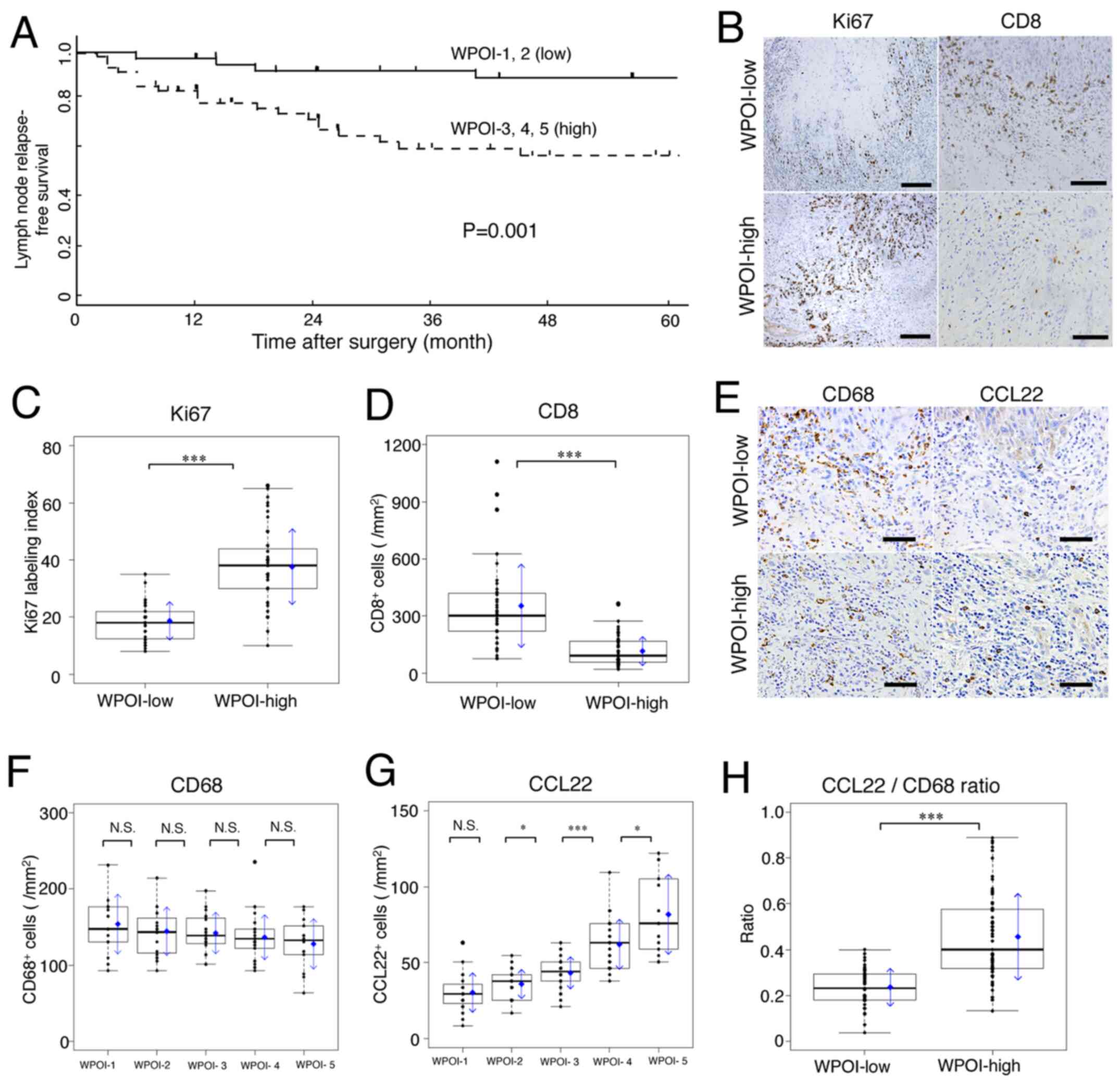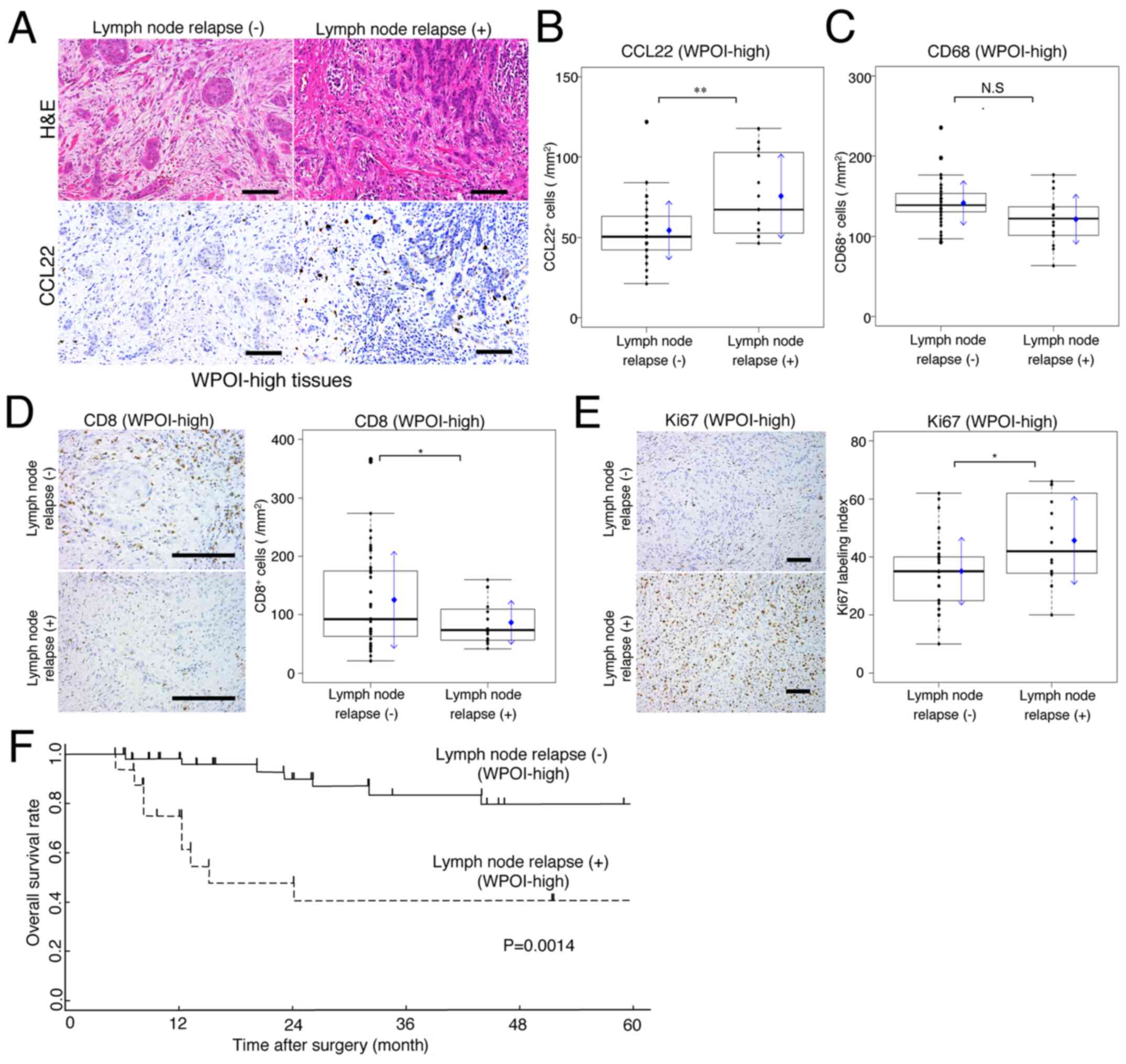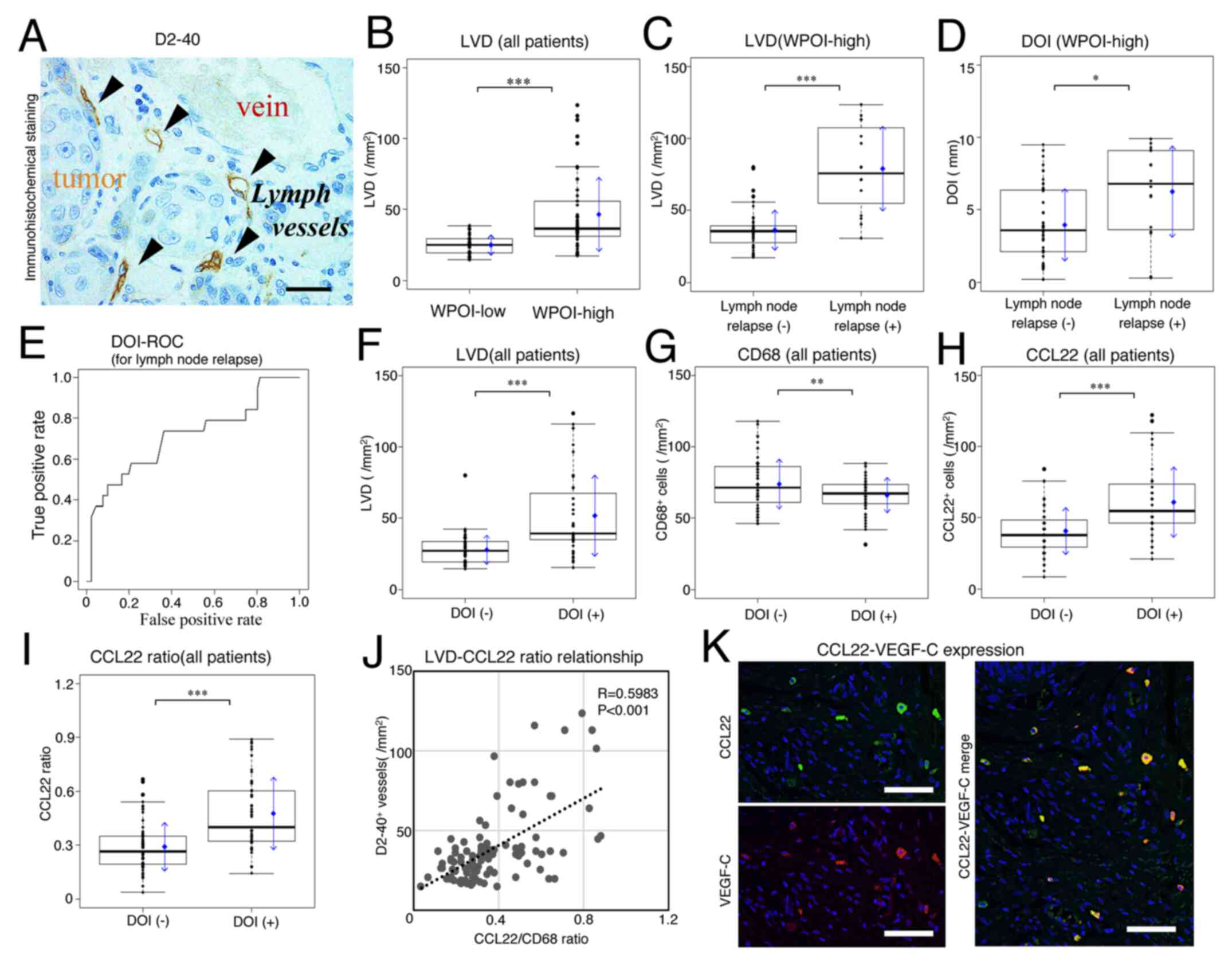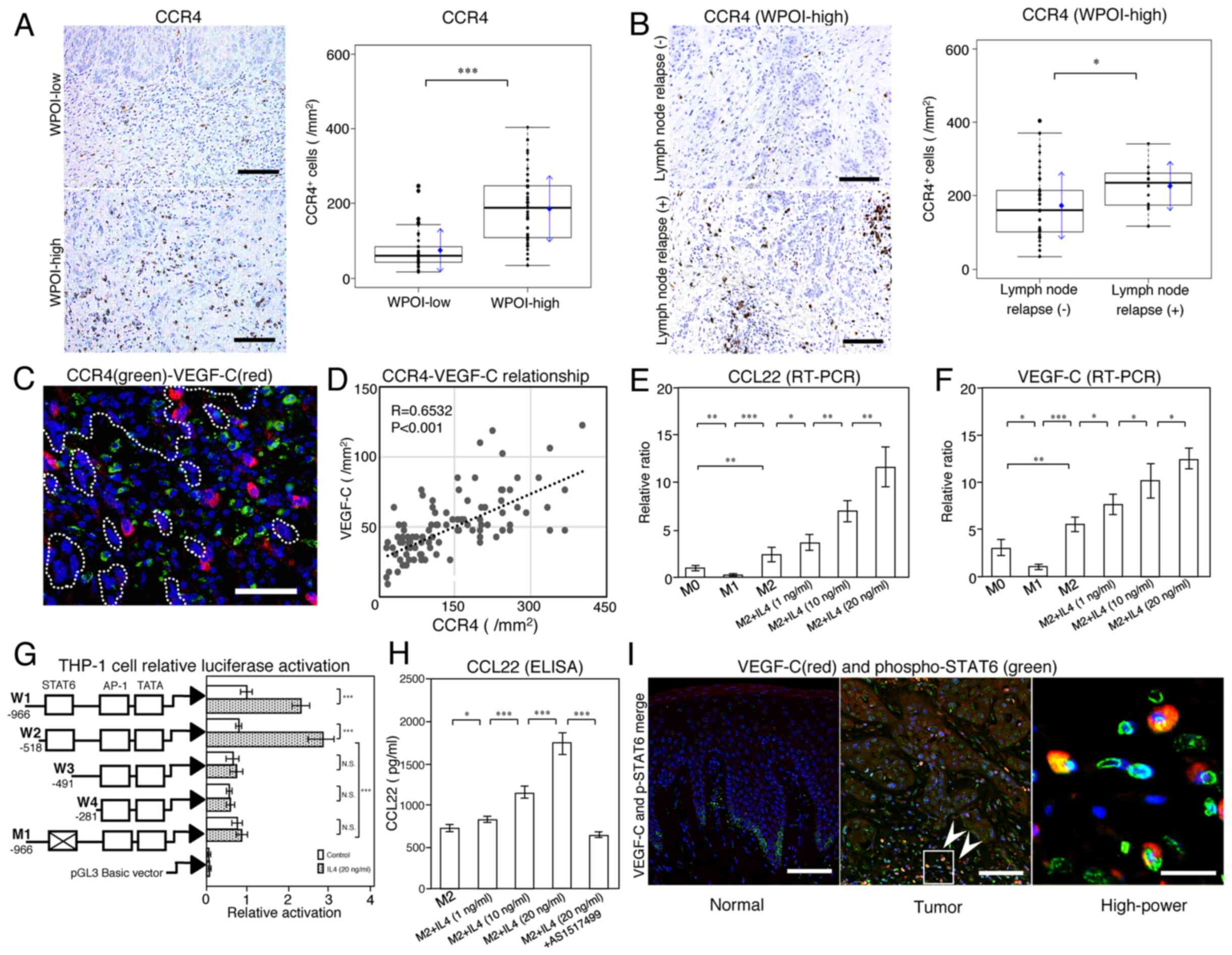|
1
|
Siegel RL, Miller KD and Jemal A: Cancer
statistics, 2015. CA Cancer J Clin. 65:5–29. 2015. View Article : Google Scholar : PubMed/NCBI
|
|
2
|
Warnakulasuriya S: Global epidemiology of
oral and oropharyngeal cancer. Oral Oncol. 45:309–316. 2009.
View Article : Google Scholar : PubMed/NCBI
|
|
3
|
Ariyoshi Y, Shimahara M, Omura K, Yamamoto
E, Mizuki H, Chiba H, Imai Y, Fujita S, Shinohara M and Seto K;
Japanese Society of Oral and Maxillofacial Surgeons, 2002, :
Epidemiological study of malignant tumors in the oral and
maxillofacial region: Survey of member institutions of the Japanese
Society of Oral and Maxillofacial Surgeons, 2002. Int J Clin Oncol.
13:220–228. 2008. View Article : Google Scholar : PubMed/NCBI
|
|
4
|
Dünne AA, Müller HH, Eisele DW, Kessel K,
Moll R and Werner JA: Meta-analysis of the prognostic significance
of perinodal spread in head and neck squamous cell carcinomas
(HNSCC) patients. Eur J Cancer. 42:1863–1868. 2006. View Article : Google Scholar : PubMed/NCBI
|
|
5
|
Afzali P and Ward BB: Management of the
neck in oral squamous cell carcinoma: Background, classification,
and current philosophy. Oral Maxillofac Surg Clin North Am.
31:69–84. 2019. View Article : Google Scholar : PubMed/NCBI
|
|
6
|
Kimura S, Nanbu U, Noguchi H, Harada Y,
Kumamoto K, Sasaguri Y and Nakayama T: Macrophage CCL22 expression
in the tumor microenvironment and implications for survival in
patients with squamous cell carcinoma of the tongue. J Oral Pathol
Med. 48:677–685. 2019. View Article : Google Scholar : PubMed/NCBI
|
|
7
|
Kaesler S, Wölbing F, Kempf WE, Skabytska
Y, Köberle M, Volz T, Sinnberg T, Amaral T, Möckel S, Yazdi A, et
al: Targeting tumor-resident mast cells for effective anti-melanoma
immune responses. JCI Insight. 4:e1250572019. View Article : Google Scholar
|
|
8
|
Messex JK, Byrd CJ and Liou GY: Signaling
of macrophages that contours the tumor microenvironment for
promoting cancer development. Cells. 9:e9192020. View Article : Google Scholar : PubMed/NCBI
|
|
9
|
Godiska R, Chantry D, Raport CJ, Sozzani
S, Allavena P, Leviten D, Mantovani A and Gray PW: Human
macrophage-derived chemokine (MDC), a novel chemoattractant for
monocytes, monocyte-derived dendritic cells, and natural killer
cells. J Exp Med. 185:1595–1604. 1997. View Article : Google Scholar : PubMed/NCBI
|
|
10
|
Imai T, Chantry D, Raport CJ, Wood CL,
Nishimura M, Godiska R, Yoshie O and Gray PW: Macrophage-derived
chemokine is a functional ligand for the CC chemokine receptor 4. J
Biol Chem. 273:1764–1768. 1998. View Article : Google Scholar : PubMed/NCBI
|
|
11
|
Curiel TJ, Coukos G, Zou L, Alvarez X,
Cheng P, Mottram P, Evdemon-Hogan M, Conejo-Garcia JR, Zhang L,
Burow M, et al: Specific recruitment of regulatory T cells in
ovarian carcinoma fosters immune privilege and predicts reduced
survival. Nat Med. 10:942–949. 2004. View
Article : Google Scholar : PubMed/NCBI
|
|
12
|
Imai T, Nagira M, Takagi S, Kakizaki M,
Nishimura M, Wang J, Gray PW, Matsushima K and Yoshie O: Selective
recruitment of CCR4-bearing Th2 cells toward antigen-presenting
cells by the CC chemokines thymus and activation-regulated
chemokine and macrophage-derived chemokine. Int Immunol. 11:81–88.
1999. View Article : Google Scholar : PubMed/NCBI
|
|
13
|
Biedermann T, Schwärzler C,
Lametschwandtner G, Thoma G, Carballido-Perrig N, Kund J, de Vries
JE, Rot A and Carballido JM: Targeting CLA/E-selectin interactions
prevents CCR4-mediated recruitment of human Th2 memory cells to
human skin in vivo. Eur J Immunol. 32:3171–3180. 2002. View Article : Google Scholar : PubMed/NCBI
|
|
14
|
Franciszkiewicz K, Boissonnas A, Boutet M,
Combadière C and Mami-Chouaib F: Role of chemokines and chemokine
receptors in shaping the effector phase of the antitumor immune
response. Cancer Res. 72:6325–6332. 2012. View Article : Google Scholar : PubMed/NCBI
|
|
15
|
Zwaans BM and Bielenberg DR: Potential
therapeutic strategies for lymphatic metastasis. Microvasc Res.
74:145–158. 2007. View Article : Google Scholar : PubMed/NCBI
|
|
16
|
Moussai D, Mitsui H, Pettersen JS, Pierson
KC, Shah KR, Suárez-Fariñas M, Cardinale IR, Bluth MJ, Krueger JG,
Carucci JA, et al: The human cutaneous squamous cell carcinoma
microenvironment is characterized by increased lymphatic density
and enhanced expression of macrophage-derived VEGF-C. J Invest
Dermato. 131:229–236. 2011. View Article : Google Scholar
|
|
17
|
Nakagawa T, Ohnishi K, Kosaki Y, Saito Y,
Horlad H, Fujiwara Y, Takeya M and Komohara Y: Optimum
immunohistochemical procedures for analysis of macrophages in human
and mouse formalin fixed paraffin-embedded tissue samples. J Clin
Exp Hematop. 57:31–36. 2017. View Article : Google Scholar : PubMed/NCBI
|
|
18
|
Yamagata Y, Tomioka H, Sakamoto K, Sato K,
Harada H, Ikeda T and Kayamori K: CD163-positive macrophages within
the tumor stroma are associated with lymphangiogenesis and lymph
node metastasis in oral squamous cell carcinoma. J Oral Maxillofac
Surg. 75:2144–2153. 2017. View Article : Google Scholar : PubMed/NCBI
|
|
19
|
Kimura S, Noguchi H, Nanbu U, Wang KY,
Sasaguri Y and Nakayama T: Relationship between CCL22 expression by
vascular smooth muscle cells and macrophage histamine receptors in
atherosclerosis. J Atheroscler Thromb. 25:1240–1254. 2018.
View Article : Google Scholar : PubMed/NCBI
|
|
20
|
Tsujikawa T, Yaguchi T, Ohmura G, Ohta S,
Kobayashi A, Kawamura N, Fujita T, Nakano H, Shimada T, Takahashi
T, et al: Autocrine and paracrine loops between cancer cells and
macrophages promote lymph node metastasis via CCR4/CCL22 in head
and neck squamous cell carcinoma. Int J Cancer. 132:2755–2766.
2013. View Article : Google Scholar : PubMed/NCBI
|
|
21
|
Almangush A, Bello IO, Keski-Säntti H,
Mäkinen LK, Kauppila JH, Pukkila M, Hagström J, Laranne J, Tommola
S, Nieminen O, et al: Depth of invasion, tumor budding, and worst
pattern of invasion: Prognostic indicators in early-stage oral
tongue cancer. Head Neck. 36:811–818. 2014. View Article : Google Scholar : PubMed/NCBI
|
|
22
|
Brandwein-Gensler M, Teixeira MS, Lewis
CM, Lee B, Rolnitzky L, Hille JJ, Genden E, Urken ML and Wang BY:
Oral squamous cell carcinoma: Histologic risk assessment, but not
margin status, is strongly predictive of local disease-free and
overall survival. Am J Surg Pathol. 29:167–178. 2005. View Article : Google Scholar : PubMed/NCBI
|
|
23
|
Shimizu S, Miyazaki A, Sonoda T, Koike K,
Ogi K, Kobayashi JI, Kaneko T, Igarashi T, Ueda M, Dehari H, et al:
Tumor budding is an independent prognostic marker in early stage
oral squamous cell carcinoma: With special reference to the mode of
invasion and worst pattern of invasion. PLoS One. 13:e01954512018.
View Article : Google Scholar : PubMed/NCBI
|
|
24
|
Caldeira PC, Soto AML, de Aguiar MCF and
Martins CC: Tumor depth of invasion and prognosis of early-stage
oral squamous cell carcinoma: A meta-analysis. Oral Dis.
26:1357–1365. 2020. View Article : Google Scholar : PubMed/NCBI
|
|
25
|
den Toom IJ, Janssen LM, van Es RJJ,
Karagozoglu KH, de Keizer B, van Weert S, Willems SM, Bloemena E,
Leemans CR and de Bree R: Depth of invasion in patients with early
stage oral cancer staged by sentinel node biopsy. Head Neck.
41:2100–2106. 2019. View Article : Google Scholar : PubMed/NCBI
|
|
26
|
Amin MB, Edge SB, Greene FL, Byrd DR,
Brookland RK, Washington MK, Gershenwald JE, Compton CC, Hess KR,
Sullivan DC, et al: AJCC Cancer Staging Manual. 8th edition.
Springer; New York, NY: 2017, View Article : Google Scholar
|
|
27
|
Lydiatt WM, Patel SG, O'Sullivan B,
Brandwein MS, Ridge JA, Migliacci JC, Loomis AM and Shah JP: Head
and Neck cancers-major changes in the American Joint Committee on
cancer eighth edition cancer staging manual. CA Cancer J Clin.
67:122–137. 2017. View Article : Google Scholar : PubMed/NCBI
|
|
28
|
Audet N, Beasley NJ, MacMillan C, Jackson
DG, Gullane PJ and Kamel-Reid S: Lymphatic vessel density, nodal
metastases, and prognosis in patients with head and neck cancer.
Arch Otolaryngol Head Neck Surg. 131:1065–1070. 2005. View Article : Google Scholar : PubMed/NCBI
|
|
29
|
Kimura S, Tanimoto A, Wang KY, Shimajiri
S, Guo X, Tasaki T, Yamada S and Sasaguri Y: Expression of
macrophage-derived chemokine (CCL22) in atherosclerosis and
regulation by histamine via the H2 receptor. Pathol Int.
62:675–683. 2012. View Article : Google Scholar : PubMed/NCBI
|
|
30
|
Kanda Y: Investigation of the freely
available easy-to-use software ‘EZR’ for medical statistics. Bone
Marrow Transplant. 48:452–458. 2013. View Article : Google Scholar : PubMed/NCBI
|
|
31
|
D'Alessio S, Correale C, Tacconi C,
Gandelli A, Pietrogrande G, Vetrano S, Genua M, Arena V, Spinelli
A, Peyrin-Biroulet L, et al: VEGF-C-dependent stimulation of
lymphatic function ameliorates experimental inflammatory bowel
disease. J Clin Invest. 124:3863–3878. 2014. View Article : Google Scholar : PubMed/NCBI
|
|
32
|
Komohara Y, Fujiwara Y, Ohnishi K and
Takeya M: Tumor-associated macrophages: Potential therapeutic
targets for anti-cancer therapy. Adv Drug Deliv Rev. 99:180–185.
2016. View Article : Google Scholar : PubMed/NCBI
|
|
33
|
Miyasato Y, Takashima Y, Takeya H, Yano H,
Hayano A, Nakagawa T, Makino K, Takeya M, Yamanaka R and Komohara
Y: The expression of PD-1 ligands and IDO1 by macrophage/microglia
in primary central nervous system lymphoma. J Clin Exp Hematop.
58:95–101. 2018. View Article : Google Scholar : PubMed/NCBI
|
|
34
|
Komohara Y and Takeya M: CAFs and TAMs:
Maestros of the tumour microenvironment. J Pathol. 241:313–315.
2017. View Article : Google Scholar : PubMed/NCBI
|
|
35
|
Alitalo K, Tammela T and Petrova TV:
Lymphangiogenesis in development and human disease. Nature.
438:946–953. 2005. View Article : Google Scholar : PubMed/NCBI
|
|
36
|
Shi VY, Bao L and Chan LS:
Inflammation-driven dermal lymphangiogenesis in atopic dermatitis
is associated with CD11b+ macrophage recruitment and
VEGF-C up-regulation in the IL-4-transgenic mouse model.
Microcirculation. 19:567–579. 2012. View Article : Google Scholar : PubMed/NCBI
|
|
37
|
Roca H, Varsos ZS, Sud S, Craig MJ, Ying C
and Pienta KJ: CCL2 and interleukin-6 promote survival of human
CD11b+ peripheral blood mononuclear cells and induce
M2-type macrophage polarization. J Biol Chem. 284:34342–34354.
2009. View Article : Google Scholar : PubMed/NCBI
|
|
38
|
Zhang B, Yao G, Zhang Y and Gao J, Yang B,
Rao Z and Gao J and Gao J: M2-polarized tumor-associated
macrophages are associated with poor prognoses resulting from
accelerated lymphangiogenesis in lung adenocarcinoma. Clinics (São
Paulo). 66:1879–1886. 2011. View Article : Google Scholar
|
|
39
|
Savetsky IL, Ghanta S, Gardenier JC,
Torrisi JS, García Nores GD, Hespe GE, Nitti MD, Kataru RP and
Mehrara BJ: Th2 cytokines inhibit lymphangiogenesis. PLoS One.
10:e01269082015. View Article : Google Scholar : PubMed/NCBI
|
|
40
|
Zhang B, Wang J, Gao J, Guo Y, Chen X,
Wang B, Gao J, Rao Z and Chen Z: Alternatively activated RAW264.7
macrophages enhance tumor lymphangiogenesis in mouse lung
adenocarcinoma. J Cell Biochem. 107:134–143. 2009. View Article : Google Scholar : PubMed/NCBI
|
|
41
|
Hinshaw DC and Shevde LA: The tumor
microenvironment innately modulates cancer progression. Cancer Res.
79:4557–4566. 2019. View Article : Google Scholar : PubMed/NCBI
|
|
42
|
Fulkerson PC, Zimmermann N, Hassman LM,
Finkelman FD and Rothenberg ME: Pulmonary chemokine expression is
coordinately regulated by STAT1, STAT6, and IFN-gamma. J Immunol.
173:7565–7574. 2004. View Article : Google Scholar : PubMed/NCBI
|
|
43
|
Hsu MC, Pan MR and Hung WC: Two birds, one
stone: Double hits on tumor growth and lymphangiogenesis by
targeting vascular endothelial growth factor receptor 3. Cells.
8:e2702019. View Article : Google Scholar : PubMed/NCBI
|
|
44
|
Binnemars-Postma K, Bansal R, Storm G and
Prakash J: Targeting the Stat6 pathway in tumor-associated
macrophages reduces tumor growth and metastatic niche formation in
breast cancer. FASEB J. 32:969–978. 2018. View Article : Google Scholar : PubMed/NCBI
|


















